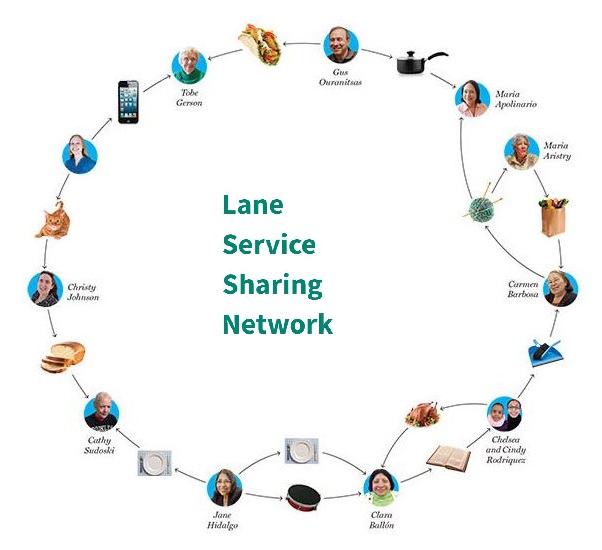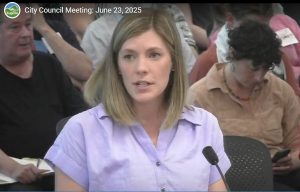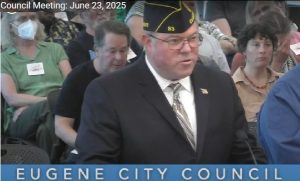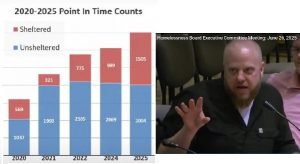Time banks ‘level the playing field’ with a currency based on equality, abundance
16 min read
Jana Thrift (Legalize Survival): Hello, this is Jana with Legalize Survival. Today, we are going to do what we love to always do, which is showcase a fabulous organization or project that we have right here locally in Eugene / Springfield area. And so, we have Thomas Price here today, and he has come to talk to us about the time bank, and I’m really interested about this, and I’m excited, actually, to be able to ask more questions. So thanks for coming, Thomas.
[00:00:33] Thomas Price (LSSN Time Bank): You’re welcome. Thank you for having me.
[00:00:36] Jana Thrift (Legalize Survival): I think we should just jump right in with asking you to kind of share first the website so people right away know if, you know, they want to look it up while you’re talking, they can actually pull it up. So share that and then tell us exactly what it’s about. What can you do with a time bank? What is this time bank all about?
[00:00:59] Thomas Price (LSSN Time Bank): Lane Service Sharing Network is the name of our time bank, so its acronym is LSSN. The time bank itself is LSSN.TimeBank.org is our main website, and then the time bank software runs on LSSN.timebanks.org. So there’s actually two websites that make the whole thing run. And it’s my understanding I could share that stuff on your Facebook.
[00:01:37] Jana Thrift (Legalize Survival): Definitely. Please do that. That would be perfect. So anybody that wants to check out and see those links and where they go and how the whole thing works and get involved. On Friends of KEPW on Facebook, you can go to that group. And we’d love to have you checking out the information that we share there about lots of stuff, but this is really interesting to me. So if somebody wants to get involved with the time bank, this particular, there’s more than—there’s lots of different time banks. Maybe you could describe a little bit first, but what is a time bank? How does it work?
[00:02:17] Thomas Price (LSSN Time Bank): The time banks are a phenomenon that has been around for a while. The core concept is: The one thing everyone has is time. We may not have a lot of money. We may not have a lot of other resources, but we usually have time.
[00:02:34] And if we can share our time with each other, which is really how most of the economy works, the grandmother that takes care of the grandkids is sharing her time; the mom doing the dishes or the kid doing chores is sharing their time. We share it collaboratively as a common place in our communities, but the time bank allows us to share it across families to other families, across your street to your neighbor, across town to the gal that has chickens that she’s raising and she’s got extra eggs, you know. It allows us to, for our own time and interest, do the things we love or want to invest our time in, and then gain credit for that in a way that we can exchange that with other people’s time that they’re investing in things they love.
[00:03:30] Jana Thrift (Legalize Survival): What a great concept. And honestly, it’s kind of the basis of trade and money came into the middle, but really it’s our time that we’re giving when we go to work and I love how you’re kind of cutting out a lot of the stuff that the middleman—
[00:03:55] Julie Lambert (Legalize Survival): The middleman would eat up a lot of the profit here, but you’re not talking about profit though. This is a really beautiful concept.
[00:04:06] Thomas Price (LSSN Time Bank): The nice concept for me, the reason I like it is it actually allows us to value each other at the abundance of our own time. And it’s actually, it changes the paradigm. Instead of paying as little as I can to get you to do work to make me profit, I’m going to give you the abundance of my time for the time that you want to give, you know, any number of exchanges.
[00:04:31] So, because you’re a volunteer station, you already have people giving the abundance of their time to this project known as PeaceWorks, this radio station. And it just allows us actually a better way to affirm and appreciate people because if we let them record their time On the time bank, then they can use that time that they’ve invested here to create an exchange elsewhere.
[00:05:01] and that’s the level we’ve gone to, so I’m going to give a little background or history on this. This time bank was birthed out of what was known as Cooperation Eugene. It was nonprofit-formed, and we studied what kind of cooperative things we could do in Eugene to deal with some of the many issues we were seeing. And early on in our studies, and we were studying Cooperation Jackson and Cooperation All-kinds-of-other-places, and seeing the different projects that they were putting together and doing, time banking kept coming up as a thread that people were using.
[00:05:39] We also had people that had been involved in working around disasters or after disasters. One of the things that we don’t always have is abundance of funds. So Christchurch, back when they had a earthquake down in Australia/New Zealand area, there was a push to use the time banks to recover after it because they didn’t have abundance of funds, but people could invest their time. They were going to respond to this earthquake anyway, and they just started tracking each other’s time to basically eventually appreciate each other for coming together and doing the recovery after effort after the earthquake.
[00:06:22] As that being said, so we chose to actually take two years to investigate time banks and the different software out there and do the developmental work. So we had actually put a lot of hard work into creating this time bank. Our time bank has been alive for a number of years now and is even going through one of its first software iterations. But time banking doesn’t always have to be on software. It’s really about exchanging our time with each other.
[00:06:54] And there are ways to create networks of trust and value each other’s time and have exchanges, whether you’re on the software or not. So it doesn’t have to always be online.
[00:07:07] Jana Thrift (Legalize Survival): Nice. So how would you how would you reach somebody to get involved if you weren’t online? Would you be specifically trying to be involved with LSSN or would, can you call a phone number or how—?
[00:07:29] Thomas Price (LSSN Time Bank): We don’t currently have our phone number active. We did have a Google Voice number and one of our facilitators that had that Google Voice has moved out of the area. So that’s something I can’t share right now, but we will probably have that again.
[00:07:43] I may end up using my Google Voice number for that after a while, but there, so just so you know, one of the things we do is we try to partner with other organizations that are already doing things in the community and either table at their events or find ways to even just go out and be part of an event and help give credit for the time around that event and basically through sharing, actually caring for each other, we share the time bank and the resources it has and then people get curious about it and want to, you know, be part of it.
[00:08:28] Jana Thrift (Legalize Survival): Yeah, I am really curious about it myself, and I think that it would be an excellent opportunity for our organization. So many nonprofits in town that have a lot of people that give in a way that they give their time in a way that is what they see as a valuable contribution to the community and the idea of working together to also have kind of receive something in return for that time, besides just the gift that you get from being involved and which actually is, that, you know, there’s a lot of different things that we get from being involved with the community.
[00:09:15] Like, I feel like I have rewarding moments lots of the time when it comes to working with KEPW, but it would be real—I love this concept. So I’m going to encourage our members to be more involved. I know that you’ve mentioned it to us a couple of times, and I think that it would be really great for our organization. And so I think that we should say again, it’s LSSN.timebanks.org.
[00:09:48] Thomas Price (LSSN Time Bank): Right, so it’s the Lane Service Sharing Network.
[00:09:52] Jana Thrift (Legalize Survival): And if somebody wanted to just kind of figure out what was going on and I noticed that that website has a place where you just go to get started and that will kind of give you the directions for how to do it.
[00:10:06] Thomas Price (LSSN Time Bank): Right. Yes, even the new website or the new version of the software has the ‘Register’-type thing, which is very similar to any other online thing that you register for. We have at times put on introductory gatherings where we actually help people get online or log in for the first time. And we’ve even had people who are what we call ‘Angel Time Bank People.’ So they’re given permission by the person that doesn’t online much to log stuff for them.
[00:10:45] And most of the software actually is set up so if say, you’re not going to be online for the next week, but I’ve done an exchange with you, I can do the exchange on my side. It doesn’t matter whether you’re the giver or the receiver, you can still log it, so to speak.
[00:11:01] Jana Thrift (Legalize Survival): Nice.
[00:11:03] Julie Lambert (Legalize Survival): I’d like to hear some examples of what people are time-banking.
[00:11:09] Thomas Price (LSSN Time Bank): Well, we’ve time-banked everything from—Many time banks limit themselves to more of the service-only exchange, and that’s what we started out, as we were trying to break down the walls of the economy. And so we’ve even had people do setups with a room for rent and time banking. It’s really no different than if you rented out your room and required someone to do certain amount of chores around the house.
[00:11:40] You know, there’s ways to make exchanges. we’ve had people, like I mentioned, the gal that had the organic egg chickens that were overproducing and they didn’t have enough, you know, venues to sell or they’re basically giving their eggs away and so they decided to share them on the time bank.
[00:12:02] And we actually had a funny conversation about it and started to play with the idea of we could even, if you value, you know, consider back then, you know, a minimum wage hour, you could give more for a dozen eggs than just cause she was doing such a great job and a great service during COVID of having these drops on porches and stuff, or you can pick them up on her porch.
[00:12:35] Yeah, it was one of those things that kept the exchange alive while we weren’t always seeing each other in person. We could share these things and we actually got to where we were valuing each other in many ways over COVID, a lot of times was just shopping for each other or getting out and doing things, if you were going to do stuff, we’d collaborate.
[00:12:55] One of the other things: We worked with a farm and they actually taught how to do pruning as well as they gifted through the time bank, many of their different surpluses of produce and fruits and vegetables and things.
[00:13:16] So anything can really be exchanged. It’s really up to the person offering and the person receiving to make the exchange. And that’s the thing about time banks is, it’s a one-on-one and no one really sets that price, so to speak, if you want to call it a price. It’s your time, depending on how you want to value that person. And with respect to your time, you can give them more hours than they would you regularly get, you know, if you had to go exchange that for an hourly wage.
[00:13:50] Or you can get a $70 massage for an hour’s time too, because it’s all just your time that you’re exchanging.
[00:13:59] Julie Lambert (Legalize Survival): That’s wonderful.
[00:14:01] Jana Thrift (Legalize Survival): So you can value it as what you think in both directions, right? Somebody can say, this is what I value my time for, and this is what it seems like their time is worth. That’s really great.
[00:14:14] Thomas Price (LSSN Time Bank): And there are ways to put pass-through costs. Say you’re going to make a, you put out there that if you like to cook and you want to cook for people, they could basically have a pass-through cost of the ingredients. Or, if you’re going to build a deck for someone, you can have a pass-through cost of the lumber. But it’s all up to you and how you make your agreements and how you make those exchanges. And they’re really just either verbal or through kind of like email chat. You decide what you’re willing to receive, willing to take for your service and they decide what they’re willing to give for that.
[00:14:53] And it really does change the paradigm because we come from an abundance mindset. We all have the same amount of time as each other. So it evens the playing field, you’re not dealing with one person that has lots of wealth and another person that doesn’t. We all have the same 24 hours in the day.
[00:15:13] Jana Thrift (Legalize Survival): I really love that.
[00:15:15] Julie Lambert (Legalize Survival): Well said.
[00:15:16] Jana Thrift (Legalize Survival): Yeah, it’s like the equality of it. And I mean, really, if you think about it, time is the most precious thing we have, when it comes to this Earth experience, at least, you know? (Yeah.) That’s because we only have so much of that and, and so finding a way to feel like your time is valued in the way that you feel like it should be and you can value others in a fair way to, I just, it’s, yeah, it’s really a great concept.
And I think that it is really interesting to be talking about on Legalize Survival because there is a piece of what we’ve created societally that has made it super-hard for people to survive. And there is a definite inequality that is existing that is part of that paradigm that it seems like this is kind of countering and creating a level playing field for people that could offer their time.
[00:16:18] And you know, this show has covered a lot of topics from the Black Lives Matter to climate change when it comes to our survival and the things that play into it, both legally and regulatory kind of things that change our ability to survive and thrive, you know, thriving is my goal. Actually. I wonder if we should change the name of the show.
[00:16:55] Anyway, though, for me it’s like, a lot of it has been really based around the unhoused and the struggle that people have with the criminalization of things that just are unavoidable, like what it takes to exist somewhere. And so this seems like it really does create an opportunity, not only for housed people that is, which is really great.
[00:17:21] That it also creates a special opportunity for unhoused community to kind of find a place where there’s a more level playing field, because I think they kind of struggle with finding a level playing field to create change and be a part of a society, that kind of sometimes feels like they’re throwing away a certain group of people that are not considered employable at all, sometimes it seems like.
[00:17:53] Julie Lambert (Legalize Survival): It would be nice if people were able to put their skills out there and be able to utilize them. And what often happens if you’re displaced, you don’t get to do your trade anymore. And, you know, it might be nice to go out there and do it in exchange. Maybe somebody’s willing to do that for whatever trade you have.
[00:18:16] I love this concept. And I think it’s very—its approach towards community-building is aptly applied in our community. We have a lot of people with a lot of time and a lot of enthusiasm. (Yeah.)
[00:18:34] Thomas Price (LSSN Time Bank): And the other nice thing about time banking is most of us end up in whatever job in a fiat economy that we either get educated for, or lucky enough to get in one way or another, but some of us tire of that fiat economy job or whatever way we’ve been surviving, so to speak, and it allows you to actually reach out or branch out and try some of the things you want to do.
[00:19:06] You know, if you wanted to paint or you want to do something that you’re currently not marketable at, you can get some experience doing it by putting it on the time bank and, you know, grow your skills and ability in a place that you wanting to, you know, experience that success, so to speak, or that beginning where someone might not have paid for it in the fiat economy, because it seems like too much to cost if you’re offering it and someone gives you the chance to get started, you can use them as references and everything else.
[00:19:45] Jana Thrift (Legalize Survival): Oh, that’s another whole level right there. That’s really cool. Yeah. It’s, you know, when you’re talking about that, it reminded me of something that a young woman has been going through, you know, when you get, when you’re starting out your life and you’re trying (a woman I know) when you’re starting out your life and you’re trying to find your first employment, you know, it can be very difficult.
[00:20:11] And the first thing she managed to get employment with was as a housekeeper for hotels. And she said that now she managed to do that, it seems like she can’t figure out how to get anything else happening, because every time she applies for things that are different than that, that it seems like she’s not able to get the position and then, of course, she finds herself back in that housekeeping job, which is actually not really what she wants to be doing.
[00:20:43] So. Yeah, iit seems like so many avenues it’s opening up for different people and different ways to find different ways to thrive.
[00:20:54] Julie Lambert (Legalize Survival): Yes, I like that, to thrive. Yeah.
[00:20:59] Jana Thrift (Legalize Survival): Okay, well, are there any upcoming events? Do you have, I know you had talked a little bit about that, sometimes you do things to kind of show people the ins and outs in a live event, or do you have anything else going on you want to share?
[00:21:15] Thomas Price (LSSN Time Bank): Yeah. I don’t have a specific one that’s marketable. We’ve actually partnered with the River Road Parks and Rec District in the past, and when they’ve had those sustainability shows and stuff, we’ve been partnering a table in there.
[00:21:31] I don’t know if you know what opportunities will come up next, but those are the kind of things that we’re always looking for synergies and opportunities. We were even a part of the long-term recovery also, had one of the first new nonprofits from the long-term recovery of the McKenzie partner with us and Love First is one of our nonprofit partners that are on board with time bank too.
[00:21:57] Julie Lambert (Legalize Survival): Nice.
[00:22:00] Jana Thrift (Legalize Survival): Very nice. And so I would assume that that kind of information will be available on the website. When you start doing some stuff, somebody could find that information there at the website, which is the LSSN.timebanks.org.
[00:22:20] Thomas Price (LSSN Time Bank): Yeah, most of the history was on the time bank itself in the past. We’re migrating all that, so it might be a little bit of a searcher island at the moment for a lot of the history that I’m giving you orally here. But it will all be back up and on the time bank or make extra pages of the old stuff, and put it back on the website itself.
[00:22:46] Julie Lambert (Legalize Survival): Just for the record, I was using it successfully today. Both sites. I had a couple hiccups, but nothing major. (Yeah, thank you.) They’re definitely working.
[00:22:55] Jana Thrift (Legalize Survival): You can register for the time bank itself at LSSN.timebanks.org, and that’s where the time bank itself, the software where you make offers or receive— (Right.)
[00:23:09] Thomas Price (LSSN Time Bank): Record exchanges. And eventually our events and stuff will be back up there as well.
[00:23:16] Jana Thrift (Legalize Survival): Sweet. So then anybody interested can go to one or the other of those websites. I really want to thank you, Thomas, because a lot of the time when I hear about something cool going on in our community, your name comes up. You’re involved with a lot of different cool stuff.
And so I just had to put that out there as well as the time bank and just, you know, on this show, the reason that we showcase a cool project or something going on is because different people in our community do a lot of amazing things to try to support the community at large, and I think you’re one of those guys, and I wanted to really give you a shout of appreciation for that.
[00:24:01] Julie Lambert (Legalize Survival): Yeah, it’s been an honor to have you.
[00:24:03] Thomas Price (LSSN Time Bank): Well, thank you. It’s been an honor to be on here, and I’ve been in your area doing it for over 25 years now.
[00:24:10] Jana Thrift (Legalize Survival): All right. Well, next time we’ll talk about more about this time bank stuff. Next time I see you hopefully I’ll be able to share my cool experiences.
[00:24:21] Thomas Price (LSSN Time Bank): Sounds wonderful.
[00:24:22] Julie Lambert (Legalize Survival): Thank you, Thomas.
[00:24:24] Thomas Price (LSSN Time Bank): Thank you.
[00:24:26] Jana Thrift (Legalize Survival): Right. So big thanks to Thomas Price for sharing information about the time bank with us.
See other stories about the LSSN time bank by Karin Lacy and Maxime Zahra.



